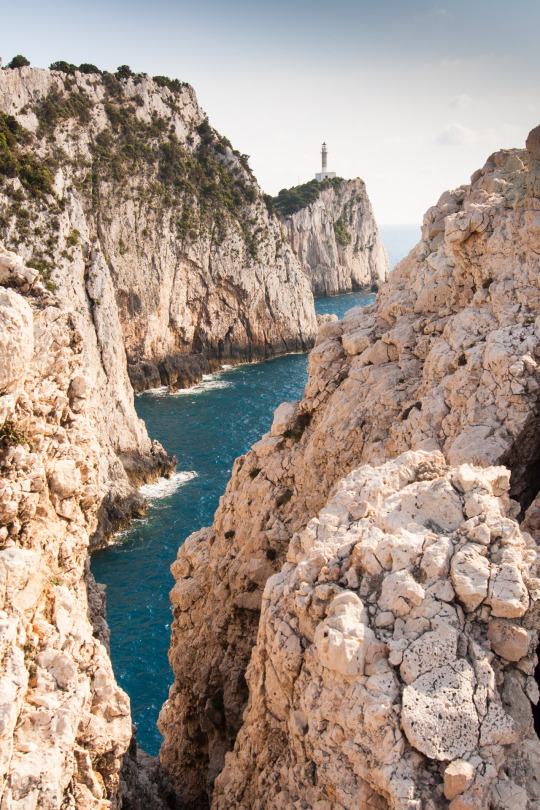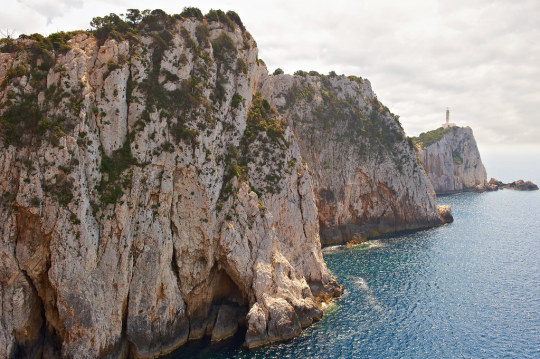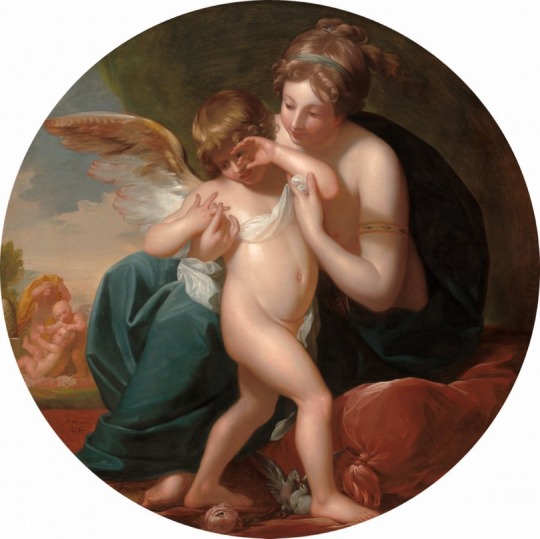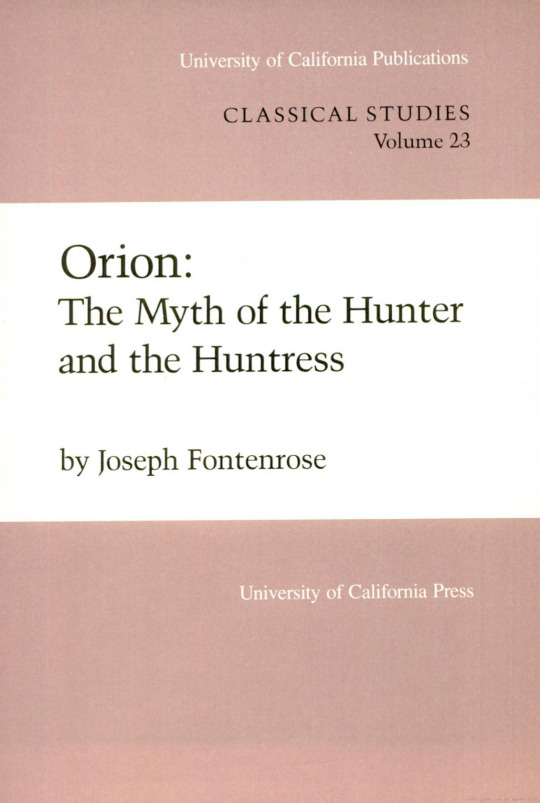Text
Natural 'Love Remedies' in the lanscapes of ancient greek myths. Part I: The White Rock
Sorry for the long post in advance, there are too many references and too much scholarly discussion to make a short snappy post. I abridged as much as I could :)
The White Rock is first mentioned in passing in the Odyssey, as part of the westward journey that the shades of the suitors undertake as they're led to to the underworld:
And they passed by the streams of Okeanos and the White Rock [Λευκάδα πέτρην]
and past the Gates of the Sun and the District of Dreams. (Od. 24. 11-12)
This passage has at first glance little thematic relevance to the rest of the attestations to come (if you're interested in theories see further reading below), but I'd be remiss not to mention this first source for a "White Rock". The rest or these sources refer to the White Rock specifically of the island of Leukas (the Leukadian Rock), which was said to have the property of relieving the lovesick from their passion. According to Menander (in Fragment 258 quoted in Stabo's Geography):
It contains the temple of Apollo Leucatas, and also the 'Leap', which was believed to put an end to the longings of love. As Menander says, "Where Sappho is said to have been the first, when through frantic longing she was chasing the haughty Phaon, to fling herself with a leap from the far-seen rock, calling upon thee in prayer, O lord and master". Now although Menander says that Sappho was the first to take the leap, those who are better versed than he in antiquities say that it was Cephalus, the son of Deïoneus, who was in love with Pterelas. (Strab. 10.2.9)
Strabo is presumably quoting Menander's lost play The Leukadia. Unrelated to love but still interesting, Strabo continues:
It was an ancestral custom among the Leucadians, every year at the sacrifice performed in honor of Apollo, for some criminal to be flung from this rocky look-out for the sake of averting evil, wings and birds of all kinds being fastened to him, since by their fluttering they could lighten the leap, and also for a number of men, stationed all round below the rock in small fishing-boats, to take the victim in, and, when he had been taken on board* (alternatively: resuscitated), to do all in their power to get him safely outside their borders. (Strab. 10.2.9 continued) ~~ This might be seen as somewhat paralleling Pausanias 10.32.6 for those who are curious.
According to Wilamowitz (again see further reading below), Menander chose for his play a setting that was known for its exotic cult practice involving a white rock, and conflated it in the quoted passage with a literary theme likewise involving a white rock. There are two surviving attestations of this theme, in which falling off the white rock is apparently a metaphor for fainting (due to lust and wine respectively):
One more time taking off in the air, down from the White Rock into the dark waves do I dive, intoxicated with lust. (Anacreon PMG 370)
I would be crazy not to give all the herds of the Cyclopes
in return for drinking one cup [of that wine]
and throw myself from the White Rock into the brine,
once I am intoxicated, with eyebrows relaxed.
Whoever is not happy when he drinks is crazy. (Euripides Cyclops 163-168)
Sappho's legendary (and unfortunately fatal) leap off the Leucadian Rock to relieve herself of her love for the handsome Phaon (a figure that deserves a post of their own) is found also in Ovid's Heroines:
Here, when, weeping, I laid down my weary limbs, a Naiad stood before my eyes. She stood there and said: ‘Since you burn with the fires of injustice, Ambracia’s the land to be sought by you. Apollo on the heights watches the open sea: summoning the people of Actium and Leucadia. Here Deucalion, fired by love of Pyrrha, cast himself down and struck the sea without harming his body. Without delay love turned and fled from his slowly sinking breast: Deucalion was eased of his passion. The place obeys that law. Seek out the Leucadian height right away, and don’t be afraid to leap from the rock! (Ov. Her. 15. 165–220)
Finally, according to the mythographer Ptolemy Chennos (know for his bizarre stories) as quoted by Photius in his Library:
Those who leapt off the cliff are said to have freed themselves from erotic desire. And this is the story that lies behind it: it is said that,
after the death of Adonis, Aphrodite wandered about in search of him until she found him in the city of Argos in Cyprus in the sanctuary of Apollo Erithios. She carried him away [for a funeral], having told Apollo about her love for Adonis. Apollo took her to the
Leucadic Rock and ordered her to jump off the cliff. As she leapt, she freed herself of her love. They say that when she inquired about
the reason, Apollo replied that as a seer he knew that whenever Zeus felt desire for Hera, he would come to the rock, sit there and free
himself from the desire. Many other men and women who suffered from lovesickness got rid of it when they jumped off that cliff. (Photius Bibliotheca. 152-153. Bekker)
What follows is a long list of people who are said to have jumped off said cliff, some surviving while others not (in any case, quite darkly, all were relieved of their passions). Notably Sappho, the most celebrated leaper, is not mentioned.
The fact that Zeus is mentioned as only sitting on the rock and not hurling himself from it is interesting. Nagy (see below) notes the similarities between the Leucadic Rock and the "proverbially white" Thoríkios pétros ‘Leap Rock’ of Attic Kolonos (Sophocles Oedipus at Colonus). He also notes the double etymology of "Thoríkios" as derivable from the noun thorós ‘semen’ (e.g. Herodotus 2.93.1) as well as of the verb thrṓiskō ‘leap’ (which can also have the side-meaning ‘mount, fecundate’ e.g. Aeschylus Eumenides 600), and connects it with one of the myths that is said to have taken place on this mountain:
Others say that, in the vicinity of the rocks at Athenian Kolonos, he [Poseidon], falling asleep, had an emission of semen, and a horse Skúphios came out, who is also called Skīrōnítēs. (Scholia to Lycophron 766)
Poseidon Petraîos [= of the rocks] has a cult among the Thessalians … because he, having fallen asleep at some rock, had an emission of semen; and the earth, receiving the semen, produced the first horse, whom they called Skúphios. (Scholia tο Pindar Pythian 4.246)
According to Bednarek (see below), in view of Ptolemy’s humorous intentions in his collection of weird stories, the story becomes a sort of "sophomoric riddle": What cure does Zeus have to administer "repeatedly" (εὶ ἐρῶν … ἐκαθέζετο καὶ ἀνεπαύετο), while sitting down, presumably alone and in secrecy, that clearly only provides a temporary relief, and provides an aitiological name for the White Rock, to free himself from his desire?
All this long-winded post just to make a fucking joke about Zeus having a wank. Worth it.



~~ Cape Lefkatas
Secondary Sources and Futher Reading (these are only the ones I mentioned in this post, apparently there's a lot to say on the subject):
Greek Mythology and Poetics, Gregory Nagy: Chapter 9. Phaethon, Sappho’s Phaon, and the White Rock of Leukas: “Reading” the Symbols of Greek Lyric. https://chs.harvard.edu/chapter/chapter-9-phaethon-sapphos-phaon-and-the-white-rock-of-leukas-reading-the-symbols-of-greek-lyric-pp-223-262/
Levaniouk, Olga. 2011. Eve of the Festival: Making Myth in Odyssey 19. Hellenic Studies Series 46. Washington, DC: Center for Hellenic Studies https://chs.harvard.edu/chapter/17-penelope-and-the-penelops/
Bednarek, Bartłomiej. “Zeus on the Leucadic Rock. White magic of an obscene passage in Ptolemy Chennos.” Acta Classica 62 (2019): 219–27. https://www.jstor.org/stable/26945053.
Sappho und Simonides, Untersuchungen über griechische Lyriker by Wilamowitz-Moellendorff, 1913
#omg#greek mythology#Leucadian Rock#white rock#Sappho#Phaon#Zeus#Hera#Apollo#Aphrodite#Adonis#Zeus why?!
7 notes
·
View notes
Text
„Come, do for me A task I’ll tell you of, and that fine toy Of Zeus I’ll give you (when he was a boy With boyish ways in the Idaean cave, His dear nurse Adrasteia made and gave It to him). It is a well-rounded ball. … All its zones are gold, and round Each one of them a double seam is bound. Each stitch is hidden; over everything Is a dark-blue spiral. Toss it – it will zing Just like a flaming star.” (Apollonios Rhodios, Argonautica)
Ok this is cute, but seriously, how many Olympians actually got to be kids and have toys made specially for them by their loving nurses?
#some godlings get to play with cool toys; others get to live inside their father's stomach. Oh well#nobody's ever said life is fair#quotes#excerpts#greek mythology#ramblings#zeus#adrasteia
11 notes
·
View notes
Note
"I am ruined, Mother," he cried,
"I am ruined and I am dying.
A small winged serpent stung me,
whom the gardeners call a bee." But Aphrodite said, "If a sting of bee distresses you, how much do you think they distress, O Cupid, those whom you shoot?"

I don’t why but him calling a bee a winged serpent pisses me off for some reason
Oh my god, what a drama queen!
6 notes
·
View notes
Note
I find it interesting how in the aftermath of the sacking of Troy, Athena at least in many versions shows some level of regret and punishes the Achaeans for their actions, while Hera still appeared remorseless and in the Roman versions continued to persecute Aeneas and the other Trojan survivors while Athena left them alone.
Yeah it’s pretty interesting
#not surprising though#Hera is pretty consistent in her feelings#especially hostile feelings#hera#Athena
9 notes
·
View notes
Note
Can you tell me about the relationship between Themis and Zeus and Themis relationship with Gaia because she is her first oracle
I like this passage from Euripides' Iphigenia in Tauris where Gaia tries to get revenge on Apollo after he takes over the oracle: „But when he [Apollo] came and sent Themis, the child of Earth, away from the holy oracle of Pytho, Earth gave birth to dream visions of the night; and they told to the cities of men the present, and what will happen in the future, through dark beds of sleep on the ground; and so Earth took the office of prophecy away from Phoebus, in envy, because of her daughter.” This seems to suggest that Gaia and Themis are close, and they can even be identified with each other (like in the Prometheus Bound of Aischylos) or play equivalent roles (as in the birth of Zeus), but they can also appear on opposing sides as when Gaia menaces the cosmic order by giving birth to creatures like the Gigantes while Themis remains on the side of the Olympians and even fights in the Gigantomachy herself.
Aside from the aforementioned Euripides play where Zeus approves of Apollo taking Themis' oracle, the two of them seem consistently on good terms. They plan the Trojan War together, she advises him and Poseidon to avoid a union with Thetis and marry her off to a mortal, they appear conversing in the Homeric Hymn to Zeus. In some accounts she helped Rhea save him from Kronos and gave him advice in the war against the Titans, she is one of his earliest consorts in multiple sources (Hesiod, Pindar, Apollodoros) and they are usually the parents of Eunomia, Dike and Eirene, though sometimes the Moirai, the Hesperides and some nameless nymphs are called their daughters as well.
7 notes
·
View notes
Note
which parentage Is more common for the fates was it daughters of Nyx or daughters of Zeus
Daughters of Nyx, definitely. As far as I know they are the daughters of Zeus only in Hesiod's Theogony and in the Library of Apollodoros (where Hesiod is most likely the source), though even in the Theogony they also appear as daughters of Nyx earlier in the text.
4 notes
·
View notes
Text
On a frieze from Hekate's Hellenistic temple in Lagina there is a representation of her giving to Kronos the stone he will swallow instead of the newborn Zeus, and while Hekate's involvement in helping Rhea to save her child isn't mentioned by Hesiod or attested anywhere else, this idea could be used to explain (at least in part) why Zeus honoured her so greatly.
10 notes
·
View notes
Note
She fights, however much a female can.
(Juno, I wish you'd seen - you would be kinder.)
She fights, but what man could a girl subdue,
or who would conquer Jove? As victor, Jove returns to heaven.
- Ov. Met. 2.471-5 (tr. S. McCarter, 2022) Callisto who is denied sympathy from everyone but ovid in this awful story
😭 I must say, Ovid's account of Kallisto is the only instance in classical mythology that ever really made me angry with Hera/Juno. That's a big deal and testament to his writing skills.
6 notes
·
View notes
Text
„When Zeus was fully grown, he enlisted the help of Metis, the daughter of Oceanos, and she gave Cronos a drug to swallow, which forced him to disgorge first the stone and then the children whom he had swallowed;” (Apollodoros, Library)
In all extant Greek mythology, this is the one and only account of Zeus (clearly an adult at the time) interacting with Metis before the Titanomachy, so it truly baffles me how often I see it claimed that she was his nurse or childhood teacher or mentor or whatever. I can't figure out why people are so fond of the idea of Zeus getting it on with someone who supposedly knew him as a child while being an adult themselves, but I have good news then because we actually have an instance of him getting it on with someone much older who knew him as a child (in one account at least), except it's not Metis but his auntie Themis.
#but funnily enough... for all that people love this reference from Apollodoros#they conveniently ignore how their relationship is portrayed afterwards in the same source#ramblings#greek mythology#zeus#metis#themis
6 notes
·
View notes
Note
honestly Athena and Dionysus seem like perfect opposites while both are born from Zeus one is born from the upper part while the other in the lower part, Dionysus represents the wilderness and it chaotic nature and Athena represents civilization and its orderly nature,Athena rejects her mother but Dionysus embraces his and shows her great affection and Athena is a goddess with masculine characteristics while Dionysus is a god with feminine characteristics
Yep.
13 notes
·
View notes
Text
On either side [sc. of the door] there were golden and silver dogs, immortal and unaging forever, which Hephaestus had fashioned
with cunning skill to protect the home of Alcinous the great-hearted. (Od. 7.91-94)
Eustathius goes on to suggest that the adjectives 'undying' and 'un-aging' refer not literally to biological life, but rather to the durability
of the rust-proof metals from which they were fashioned, and that the dogs were alleged to be the work of Hephaestus solely on account of
their excellent workmanship. He does, however, imply that he knows of other testimonia to these hounds when he refers to a certain "silly story" that they were a present from Hera to Poseidon for his help in some attack against Zeus in the Iliad (probably that described at 1.396-406), and that Poseidon gave them in turn to Alcinous. - Hephaestus the Magician and Near Eastern Parallels for Alcinous' Watchdogs by Christopher A. Faraone
Love the idea that after their failed coup against Zeus, Hera is just like: "Oh well, we'll get 'em next time, here are some dope magical robot dogs my son made, just a little something to express my appreciation for helping me try and upturn the order of the cosmos, thanks bro!"
26 notes
·
View notes
Text
"People tend to assume that this means that Athena, goddess of wisdom, was born from the center of Zeus's thought--a wise goddess born from the brain. However, as we have seen, for the Greeks of this time, the center of thought was actually the diaphragm. If Athena were to have been born from the center of Zeus's thought, she should have had to have burst forth from his chest like one of those monsters in Aliens. Instead, if we might apply some later Greek medical theories, the brain was believed to be where sperm was produced, which flowed thence down the spinal column to the penis. Athena, then, was not born fro Zeus's mind, but from his upper testes, just as the other child born from Zeus, Dionysos, was born from the Sky God's inner thigh."
- Stephanie L. Buddin, Intimate Lives of the Ancient Greeks
6 notes
·
View notes
Note
Wow, first time I hear about this Erinoma individual and this has to be one of the weirdest, most confusing and contrived myths I've ever read? Sometimes I really wonder where Servius found these odd stories that no one else seems to have mentioned.
What? theres a story where aphrodite helps adonis rape a girl?! I didn't know that


Yup… I hate everything surrounding Adonis’s myth.
15 notes
·
View notes
Text
„Persephone had arrived in the Underworld shivering and alone in the back of her uncle Hades’s chariot, kidnapped while picking flowers in a meadow. But even lost and terrified, she was canny. Within a week, Persephone had all the servants of Hades’s palace answering to her; within a month, she had the fealty of its magistrates. In a seamless coup, Persephone took command of the bureaucracy of hell as her ineffectual husband watched. It was said that even the three-headed dog Cerberus, guardian of the Underworld, rolled belly-up at the rustle of her skirts. Hades was relegated to the shadows of his own castle. When her mother, Demeter, demanded her return, Persephone sat at the table with her downcast husband as the messenger delivered the news. Unruffled, the goddess pulled a pomegranate from the bowl on the table and ripped it open with her bare hands, juice dribbling like blood over herfingers. In defiance of the messenger, she ate six of the jewel-like seeds that had never seen the light of the sun, binding herself to the Underworld forever. Eventually, Persephone went back to her mother, bringing a reluctant springtime in her steps. But every autumn when she returned to the kingdom of the dead, she did so with a smile.” (Luna McNamara, Psyche and Eros: A Novel)
I don't care much for this book so far, but not going to lie, I really wouldn't mind if this was a more common retelling of this myth. Giving Persephone agency without centering it on love/desire for her kidnapper ought to be a more popular concept in a world so fond of feminist retellings.
8 notes
·
View notes
Text
Lmao, I love Reddit. Just behold this hilarious comment I came across on there.
„There's an old theory, as in, it has been discussed by scholars from Ancient Greece, that thought that Demeter and Zeus genuinely loved each other before he left her for Hera because she would make for a better queen. The interesting part of that interpretation is that after that fiasco and then Iasion's death, some people believed she gave up romantic relationships with men completely , though she occasionally took female lovers.”
Sure sounds like a scholarly theory, no doubt about it. I can… ahem, find several scholarly theories of this sort, too.
#there are no accounts in which Zeus dumps Demeter for Hera or in which Demeter takes female lovers but shhh. The scholars™ have spoken#I really miss the times when people simply felt free to make shit up and admit it's made up#instead of trying so hard to pretend it's legit and true and-#ramblings#greek mythology
10 notes
·
View notes
Note
In Jennifer Saint's Hera retelling, Hephaistos is thrown off a mountain only once, by Zeus for freeing Hera from chains. However, he was hesitant to help her because he was afraid of how Zeus will react, but Hera talked him into it (which does seem in character for her) so he does take revenge on her with the throne because of her involvement in his fall.
The George O’Connor graphic novels rectifies the timeline of the Hephaestus throne story by having him get throne off Olympus twice: Once by Hera as a baby and then by Zeus as an adult, and angry that no one, not even his mother, came to get him back the second time, that is when he decided to create the throne (and it’s implied that the throne could have been meant for either parent and Hera just sat on it first). I def think it helps clarify the order of event and justifies Dionysus’ inclusion.
Damn, guy can't catch a break. Getting yeeted off a mountain not once but TWICE in the same timeline seems so excessive. 😢 It's a wonder he thought it was worth coming back. Now I'm curious in what circumstances he returned after Hera tried to get rid of him as a baby and how he refrained from getting revenge the first time.
It is really impossible to make sense of the timeline without omitting or modifying some details, and yeah, I haven't considered this before but changing the order of events in a way as to have Hephaistos send the throne after he is thrown from Olympos by Zeus could fix things quite nicely. Not sure if I really can see the same Hephaistos who advises Hera not to provoke Zeus and who was thrown from the sky (and sometimes even crippled in the process) because he tried to release her from chains being willing to have her bound once more, but it definitely could work if she acted indiferent about what Zeus did to him and he felt betrayed and hurt by her lack of gratitude.
Thanks for telling me this, I'll give it more thought.
13 notes
·
View notes
Note
I'd love to know what the four five-star books you mentioned are, as I'm also guilty of being awfully picky and maybe overly critical when it comes to greek mythology retellings.
There is a chance that I'd rate some of them differently if I were to re-read them right now, but whatever. They are „Till We Have Faces” by C.S. Lewis, „Jason and Medeia” by John Gardner, „Bright Air Black” by David Vann and „The Silence of the Girls” by Pat Barker.
#I must say that I don't have any objective criteria when it comes to rating books#and I have quite a few 4 star reads so I'm not as absurdly picky as it might seem 😢#ask#books#retellings
4 notes
·
View notes